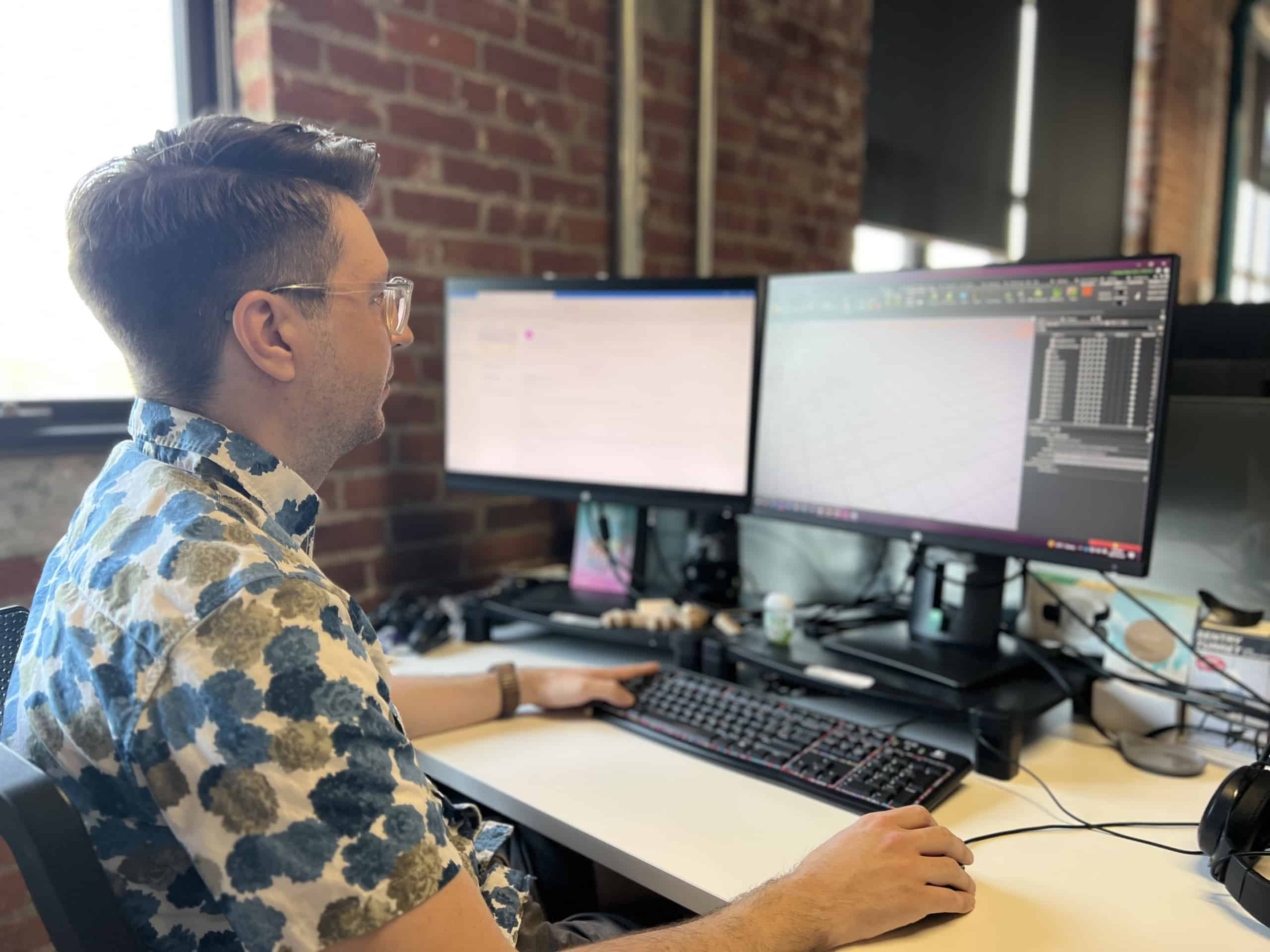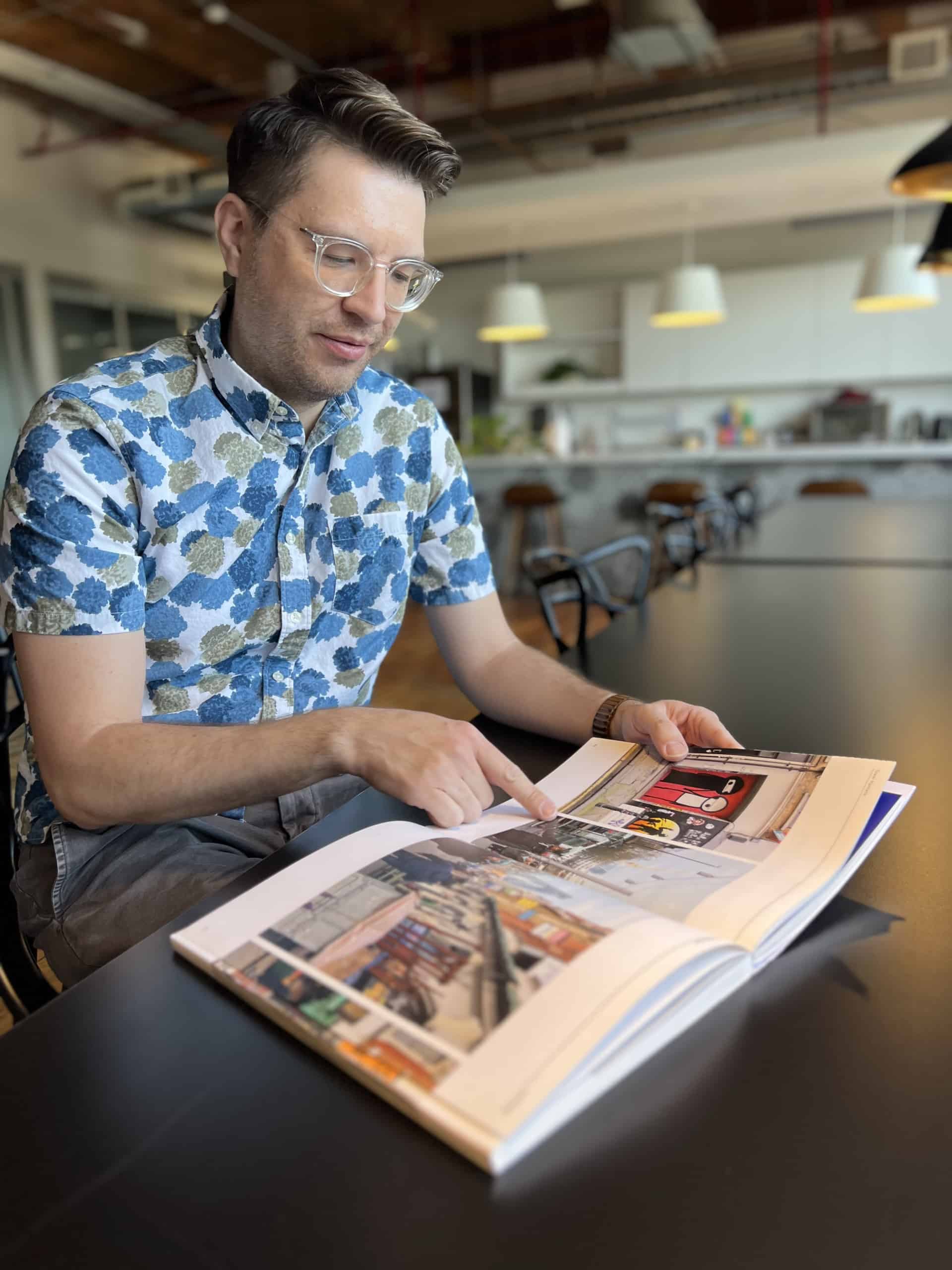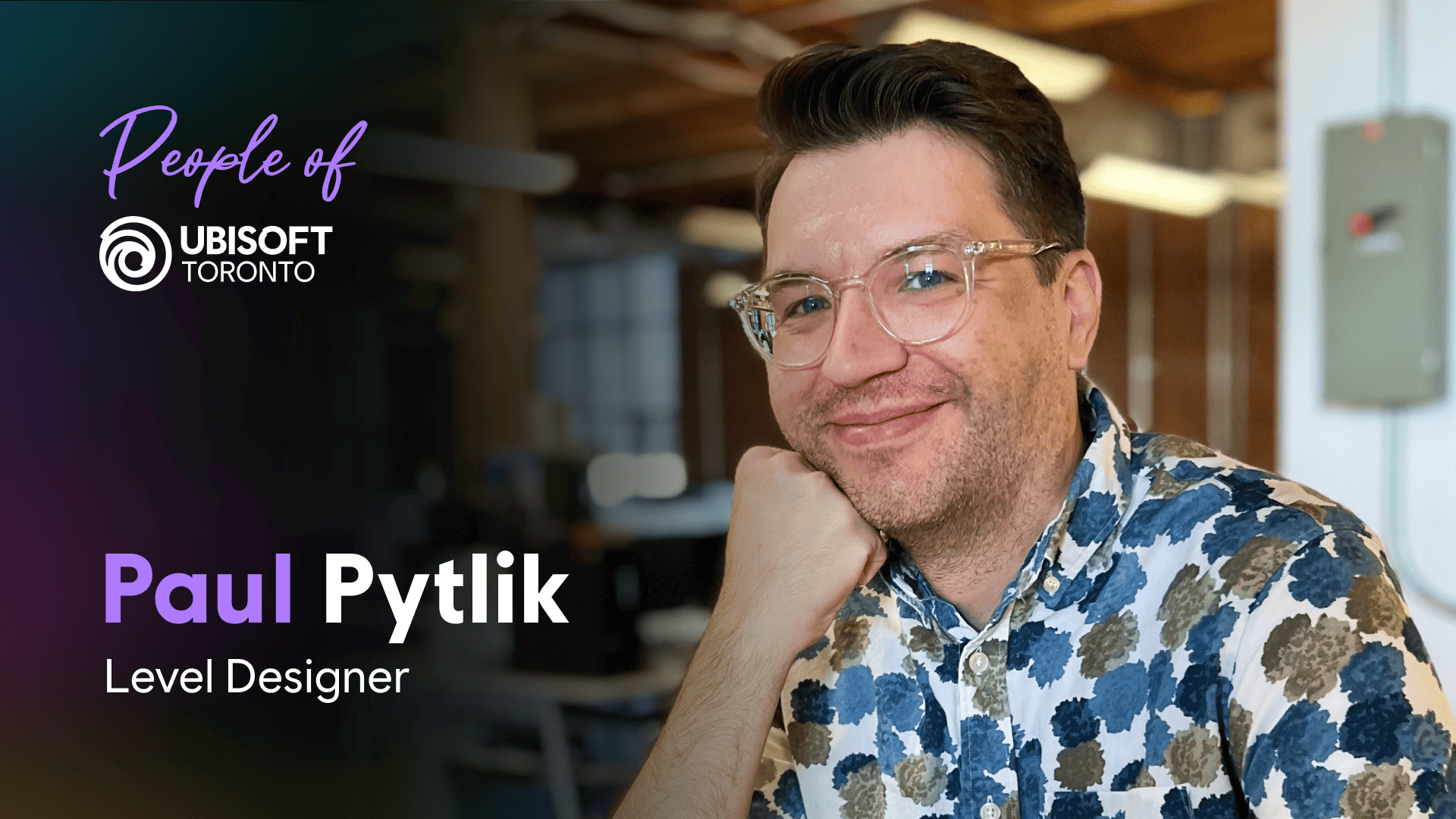A Ubisoft veteran — Paul has been a part of the Toronto studio for over 10 years! In that decade, he’s worked on multiple AAA projects including Far Cry, Watch Dogs and Splinter Cell, first as Quality Control tester before finding his calling as a Level Designer. He reflects on his career development, our UbiProud ERG, and 2SLGBTQIA+ representation and inclusion in the games industry.
ROLE RELATED
Hey Paul, tell us more about what do you do as a Level Designer? And what’s your favourite thing about your role?
On most projects, a Level Designer’s role is to own a section of the game map, and take care of everything that’s contained within those boundaries. This can range from the layouts of any points of interest in the region, the placement of any collectables, any of the activities like treasure hunts or races, and depending on the project, any missions that take place there.
The best part of a level designer’s job is that you truly do become the owner of your own section of the game, and have a real impact on the direction of the world. You interface with all departments – talking with the Art team about what unique assets would fit within the theme of your region, speaking with Narrative to share your ideas about the locations and characters that inhabit the space, working with Gameplay on any special needs you might have or making requests that may end up making it into other aspects of the game.
What drew you to Ubisoft Toronto?
I started at Ubisoft Toronto in August of 2012. The studio was still super small compared to what it is now. I was a huge fan of Assassin’s Creed, and so hearing that Ubisoft was opening a studio in Toronto sounded incredible! I read online that they were holding an event at a local college, and asked if it would be ok to drop by. I spoke with a recruiter there who put me in touch with the Quality Control (QC) manager, who was ramping up hiring, and the rest is history
What qualities or traits does it take to excel in your role?
I think there are a number of factors that go into being an effective Level Designer. Being able to communicate your ideas effectively is the first step to being able to implement them – if no one else can envision what it is you’re trying to say, you’re probably not going to get the go ahead to start work on them.
Being able to receive feedback or criticism is also vital – in most cases it’s not an indictment on your skills or ideas, but rather delivering the best player experience possible. Sometimes you get bad news that something you’ve spent weeks or months on is getting cut. The reasons can vary from Playtest feedback, scope changes, or that it’s simply not working with the game as a whole. The sooner you can accept that, the sooner you can start coming up with ways to fill the gap or shift things around to compensate. Sometimes that’s even more fun than if something shipped exactly the way you’d imagined it in pre-production!
Another important skill is the ability to put yourself in the player’s shoes. Does your layout only make sense to you because you’re the one who created it? What happens when you try to go through it in a different way – would you still get the same experience?

CAREER DEVELOPMENT
You’ve been at UbiTO for 10 years! You started in QC as a tester before moving into Level Design. How did you make that transition?
Starting in QC was actually a great way to go.
I started off as a smoke tester on Splinter Cell Blacklist, meaning I’d get in at the start of the day and play through the entire game, start to finish, making sure mission flow was correct, that the game didn’t collapse under its own weight, and if it did, that save games were working.
Working in QC opened my eyes to so many areas of production that I wouldn’t have known about otherwise, and it shed light on how things worked.
I was able to interact with a lot of people throughout the day, and wherever I could, I offered my help so that I could get my hands dirty in Editor in an actual production environment.
Additionally, Ubisoft Toronto has a great mentorship program where you can get paired with more experienced team members to learn about their career path. I was able to grab coffee and chat one on one with an expert who would give me tips they’d picked up along the way in their career, share feedback on my portfolio, or whatever else I was curious about learning. It was also a concrete way of expressing my interest in a chosen career path.
As my experience grew, I was able to show what I could do on a few level design tasks for Watch Dogs 2, and so when Watch Dogs: Legion started production, I was hired on as a Level Designer officially.
What’s your favourite project that you’ve worked on?
Watch Dogs: Legion is probably still my favourite, because it was the first project I was a Level Designer on. I joined the project right at the start of production, where only the road network was placed, with zero buildings. It was a lot of fun working on “my region” with just a few other Level Designers and Level Artists, plus our Leads – it really felt like we had a hand in shaping the game, because we were literally carving out neighbourhoods from nothing!
What’s some of the key tech/tools you use regularly in your role and how does it impact your work?
Most of my work is done in Editor – Disrupt/Dunia is what I’ve used for the entire time I’ve been at Ubisoft, but this year I’ve made the switch over to Snowdrop. It’s a completely new editor from the ground up and allows Level Designers and Level Artists to quickly iterate on ideas and see immediate results. Its flexible, innovative tech allows us to do things in game that we wished we could do years ago, but that simply couldn’t be achieved back then. It’s opened a lot of possibilities for gameplay that I think are really exciting! It’ll be fun to explore and push the boundaries of what’s possible.

When designing a level where do you look to for inspiration?
It really depends on the project in question. For Watch Dogs: Legion, we looked at a lot of British media to get a better sense of the city. However, we also took a lot of inspiration from the real world – trawling Google Maps to get the feeling of the streets right – the height of buildings, their density, how wide the roads were, types of intersections, the type of people who worked and lived there, etc.
Whereas for Far Cry, we had resources that had been gathered for us that we could call on. With my region being more naturalistic, there wasn’t any of the same reliance on the internet, so I ended up working closely with my Level Artist to brainstorm ideas and cool moments we could incorporate into unique assets to make each region feel distinct and more immersive.
STUDIO CULTURE
What surprised you most when you joined Ubisoft Toronto?
Being fresh to the industry, I wasn’t really sure what to expect. I didn’t think people would be standoffish, but I was surprised at how warm and welcoming everyone was. There was never really a sense that I was being judged for not knowing something or asking what might have been a dumb question – everyone was excited and eager to share their knowledge, and it really facilitated learning an immense amount of information in virtually no time at all.
How has hybrid & flexible work impacted your work/team’s experience?
Working from the comfort of my own home has been amazing! Not only does it save time on commuting and the effort of having to pack a lunch but I genuinely feel like it’s made collaboration even easier. Ironically making people more available to contact, since you no longer have to watch their desk like a hawk, waiting for them to get back or for someone else to leave it so you can have your turn haha.
PRIDE
You’re part of our studio’s UbiProud ERG. For folks who aren’t familiar, can you share what the ERG is about and what it means to you?
I’ve had nothing but good experiences at here at the studio which speaks highly of our teams and leadership. I’ve always felt comfortable championing and adding a gay element to the narrative or game world and have never felt othered.
UbiProud is an employee resource group for 2SLGBTQIA+ team members within the studio, however to me it’s about fostering a sense of belonging within our studio and allowing people to meet others in their community in a more organic way. The ERG has allowed the 2SLGBTQIA+ team members to have important conversations and champion our needs, which can sometimes be an unknown to our allies.
Have there been games with 2SLGBTQIA+ representation that have impacted you deeply/resonated with you?
The first Sims game was a revelation at the time, and felt incredible to play a game the way I always wanted. I feel like in a lot of ways it really got the ball rolling in allowing real representation in video games but was also kind of incidental. It was more so that the game did not “stop” players from something rather than championing it fully.
However, Mass Effect, to me, was the first time I can remember getting actual lines of dialogue and writing to support a main character being gay. Besides being one of the most impressive video game trilogies in history, the fact that they were willing to take a stand and make such an important statement and investment on behalf of the 2SLGBTQIA+ was groundbreaking and historical on its own.
What are your hopes for the gaming industry in the near future in relation to representation, diversity and inclusiveness?
While I’ve been lucky working in an inclusive environment at Ubisoft Toronto, I’m aware that the same cannot be said for many places in our industry. My hope is that one day, the value of having diverse teams isn’t just a checkbox on a hiring list and the differences people can bring to projects with their lived experience is fully embraced across the board.
At the end of the day, we all want the same thing – to make fun, exciting and rewarding games for our audiences – and we should be able to do this while acknowledging the challenges others face and using their expertise to help shape our worlds and make our products for everyone.
PERSONAL
What do you do to relax?
You’d think that after spending their day building video games, game devs would rather spend their down time doing anything else, but games are still my main method to relax. One of the most soothing games for me to play is Factorio, one that I’ve put… hmm…. 6000 hours into (according to Steam).
That seems like a lot. Is that a lot?
Oh and I also watch way too much TV, and if the power goes out, I’ll take my dogs for a walk haha.
People of Ubisoft Toronto is a series featuring studio members from a variety of projects and backgrounds as they share their experiences at our studio, perspective of the video game industry and, perhaps, even a sneak peek of what they’re working on!
Our studio values diversity and believes in embracing differences to build stronger and more creative teams. We welcome people who would like to join us and redefine the future of games. Visit our careers page for more information on open roles and how to apply. To know more about our studio members and culture, click here.

